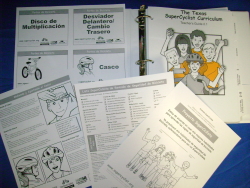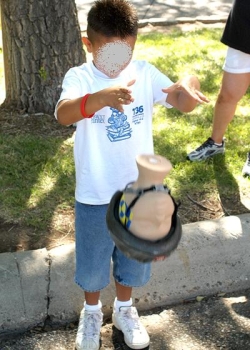Bringing Bicycle Education to Spanish-Speaking Communities
Amarillo, Texas
Source: Pedestrian and Bicycle Information Center (PBIC)
Problem
Language can be a barrier to bicycle use and safety. Bicycle safety programs need to reach non-English speaking individuals.
Unsafe bicycling behavior includes riding on the left side of the road facing traffic (instead of on the right with traffic as required by Texas law), and not wearing a helmet. Safety information to counteract these behaviors is usually offered in English, and may not be understood or accepted by non-English speaking people. Family customs of various ethnic groups can influence behavior and willingness to accept information. For instance, English-speaking children in Hispanic families may look to their parents for permission before accepting new information. If parents do not understand bicycle safety information written in English, it may be difficult for them to help their children learn to ride a bicycle safely.
Background
A significant number of Spanish-speaking individuals with limited English comprehension live in Amarillo, Texas (see table below). To serve this population, the Texas Bicycle Coalition (TBC) needed to provide bicycle safety instruction in Spanish.
| Category | Texas | Amarillo |
|---|---|---|
| Total Population | 22 million | 180,000 |
| Percent Hispanic or Latino Origin | 32 percent | 22 percent |
| Number Hispanic or Latino Origin | 7.0 million | 39,600 |
| Percent Language at Home other than English (5+ yrs. age) | 31 percent | 19 percent |
| Number Language at Home other than English (5+ yrs. age) | 6.8 million | 34,000 |
| School Population | 4.6 million | 30,000 |
| Percent Hispanic at School | 46 percent | 40 percent |
| Number Hispanic at School | 2.1 million | 12,000 |
Sources: U.S. Census Bureau "Quick Facts" website on 11/1/07 and Texas Education Agency "ASK Ted" website on 11/1/07. Numbers rounded to two reported digits.
Solution
TBC arranged for the translation into Spanish of the materials for two of its education programs, Texas SuperCyclist and BikeTexas Safe Routes to School (SRTS).
The Texas SuperCyclist curriculum is a comprehensive bicycle safety education course for 4th and 5th grade elementary school teachers and their students. Field instructors train and certify teachers in school districts across Texas so that they may, in turn, train their students in bicycle and pedestrian safety education. Curriculum materials include "Master Pages" — homework and safety information that teachers photocopy for students to take home and share with family members. In 2001, TBC arranged for the Master Pages to be translated into Spanish by a native speaker with many years of experience organizing bicycle education and Safe Routes to School activities. The translations were then certified by faculty at the Universidad Autónoma de Mexico (UNAM) in Mexico City. These translations bring the Texas SuperCyclist program to Spanish-speaking households across Texas.

SuperCyclist safety information in Spanish. Photo: Texas Bicycle Coalition
In 2004, TBC initiated the BikeTexas Safe Routes to School "Education, Encouragement and Evaluation" pilot program, and used the Texas SuperCyclist curriculum for the education component of this program. TBC received funding to introduce this program to school districts across Texas, including the Amarillo Independent School District (AISD). TBC produced the BikeTexas SRTS program materials in both English and Spanish to better serve children and their parents. These materials were approved by the Amarillo Independent School District. TBC staff and schools distributed them to students and parents via "back-pack express," regular mail, poster placement, and other means. Texas Bicycle Coalition also initiated an aggressive outreach program to build relationships with local Spanish language media.
The language in which TBC presents its educational material varies depending on the audience. At school sites, English predominates; at after-school programs or other events, Spanish is used alongside, or simultaneously, with English. At some events, only Spanish is used so that parents can easily understand. For example, a utility bill insert on bike lane safety was produced in both English and Spanish versions and distributed to 60,000 Amarillo residents through a mailing cycle and at TBC events.
Results
TBC used the translated materials to communicate bicycle safety messages to Spanish-speaking households. As a result of translating bicycle safety and education materials into Spanish, staff observed improved collaboration between local residents, schools, neighborhood associations, local businesses, law enforcement, traffic engineers, and transportation departments.
For instance, TBC witnessed encouraging results at Amarillo's KidsFest, a fair that helps prepare children for the coming school year. In 2005, approximately 5,000 people attended KidsFest. Soon thereafter, TBC staff began to develop contacts with Spanish media organizations such as Telemundo and Univision, which resulted in interviews promoting BikeTexas SRTS and KidsFest. By 2007, KidsFest attendance increased to over 12,000 children and parents. Community leaders attributed the jump in attendance to the coverage by the media.

Making a point about helmets at KidsFest: better hope the egg nestled inside the Styrofoam head doesn’t break. Photo: Texas Bicycle Coalition
At KidsFest, TBC distributed BikeTexas SRTS brochures, SuperCyclist Master Pages, business cards, training and safety flyers, and A-Z by Bike, a comprehensive guide to safe bicycling for kids and adults. TBC also offered helmet clinics, a bike skills course where kids could practice riding, and a safety class that taught kids how to check their bikes and Texas bike laws and hand signals.
Spanish-speaking staff members who understand the challenges faced by the non-English speaking community helped TBC's programs earn credibility and trust. TBC's efforts prompted other community organizations and individuals to understand the need to develop Spanish teaching materials in order to reach more children and parents on an ongoing basis.
Cost
Costs for this outreach program were included in TBC's BikeTexas SRTS and SuperCyclist programs. Funding came from private donors, the U.S. Department of Education, a Carol M. White Physical Education Program Grant, the Texas Department of Transportation, and the National Highway Traffic Safety Administration.
Web sites for more information
Information about the Texas SuperCyclist Program: http://www.biketexas.org/index.php?option=com_content&view=article&id=72&Itemid=81
The Pedestrian and Bicyclist Highway Safety Problem as it Relates to the Hispanic Population in the United States is available at
http://drusilla.hsrc.unc.edu/cms/downloads/PedBike_HighwaySafety_HispanicPopulation1.pdf
Contact
Robin Stallings and Fernando Martinez
Texas Bicycle Coalition / BikeTexas
P.O Box 1121
Austin, TX.78767
(512) 476-7433
robin@biketexas.org
fernando@biketexas.org
www.BikeTexas.org
Image sources
Texas Bicycle Coalition
November, 2007




